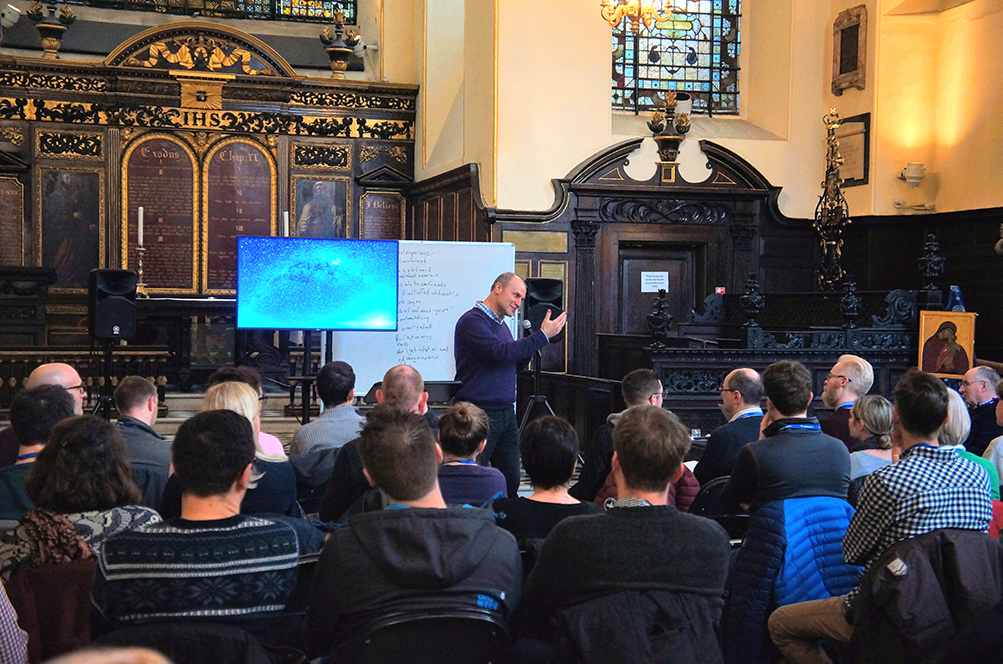What initially drew you to church planting?
I first heard about church planting through Holy Trinity Brompton (HTB). While I was at university, I heard the story of HTB sending a group of people to reopen St Barnabas Kensington and I remember thinking: “That’s cool”. After university, I started attending HTB and began to hear these stories first-hand. I attended a conference at HTB, led by the Vineyard Churches leader, John Wimber, and as I sat listening to stories about the impact of church planting, I remember thinking, “I want to be involved in this… this is what I want to do”. Therefore, at my ordination interviews, I talked about planting a church. I’m not sure that they knew what I meant!
Since theological college, I’ve continued to be passionate about church planting as I see the difference that it makes. It brings new energy, focus and mission to church communities as teams are sent out and churches are established, revitalised or reopened. Research data suggests that church planting is probably the most effective way of growing the church numerically. It’s also one of the most helpful ways of developing discipleship due to the energy and vision that it encourages. Stories of new life and growth in local parishes continue to inspire my work.
What does your role involve?
The Bishop of Islington is a unique role because it was set up to have a specific responsibility to oversee church planting in London, as well as being available to support it nationally. Instead of looking after a geographical area, it has a focus on mission and starting new worshipping communities. There’s nothing else like it in the Church of England.
I was appointed as Bishop of Islington in 2015 by the Bishop of London, Richard Chartres. Early on, the Bishop of London talked about developing a centre for church planting and growth, which would develop expertise and learning to share with the wider Church. The team who work with me reflect this vision. For example, they help churches to find ways to reach their parishes more effectively, to grow and thrive, or to start new churches. Strategically they are thinking about the places in England where the Church needs to be revitalised and how to support bishops and dioceses on this journey.
We’ve been wonderfully supported by different partners to enable our team to grow and we’re hugely grateful to Benefact Trust for funding three key roles. We now have a communications coordinator, Philippa Guy, who is sharing our vision through stories and articles. Last year, we appointed a church planting relationship coordinator, Sharon Whitmarsh, as the work was growing so rapidly in London. Thirdly, Ros Hoare is our national resourcing and relationship manager, helping to establish a pipeline of church planters for key roles such as resource churches leaders and planting curates across the country.
How has the national picture of church planting changed over the last few years?
It's changed massively! It used to be opportunistic: church planting happened in one or two places when there was a realistic opportunity in a diocese. In recent years, the Church of England has become more intentional about it. Many dioceses are saying “We want to church plant”. The creation of resource churches (churches that have an outward, church-planting focus) across cities reflects this intentionality.
Now some dioceses are going one step further by developing a strategy for planting across a whole diocese. They are exploring areas in their cities where there is a need to start new churches or revitalise struggling churches. We are even seeing a few dioceses starting to create a culture of church planting, where it becomes ‘normal’ behaviour to start new churches.
Although this feels like a huge change in the Church of England, in reality we are simply recapturing an ancient practice. When we look at our own denomination, there have been many different church planting movements across the centuries. There are also many networks outside of the Church of England that have been planting churches for years. This is just the latest version of Jesus’ command in Matthew’s Gospel to go and make new disciples (Mt 28:19-20).
How can you best prepare to church plant?
Come on our Church Planting Course! When my wife Louie and I moved to plant a church in Shadwell in 2005, there wasn’t much material on church planting. We had two cups of coffee with vicars who had already planted to hear their experience - but this was the only “formal” preparation that we had!
We developed the Church Planting Course to train people who were similarly asking, “How do we do this?” On our course, we look at the key components for a successful church plant. Firstly, it’s important to be clear about our vision and purpose: planting a missional community on an estate is very different from revitalising an existing parish church. Secondly, we need to research our context. If we assume it’s similar to our previous community, we could end up doing something inappropriate or irrelevant for our new context, even if it was a successful mission in another place.
Developing a strategy for launching, growing and nurturing our churches is also crucial. It helps us to know where we are heading and prevents us falling into financial difficulties in the future. Having a great team around us to support and encourage us on the harder days is another key for success - going it alone as a church planter is not a great idea! Lastly, it’s hugely important to soak our church plants in prayer - before, during and after the plant.
What are the first steps to getting involved in church planting?
Everyone can be involved in praying for this growing movement - we would love your prayers for unity, boldness, perseverance and generosity. It’s great to visit some church plants and see what is actually happening - church planters need our support and encouragement.
If you’re a leader or want to join a church planting team, talk to your bishop or vicar to see if there are new churches starting in your area. One of my favourite stories comes from Helen Shannon, one of our Islington Associates. Helen grew up on a council estate in North London and became a Christian at a large resourcing church. Through this church’s support, Helen returned to plant church@five on her estate in Strawberry Vale. This estate church has grown and makes a huge impact on its local community, showing how established churches can send teams to plant inside their parishes to reach new groups of people. And now she helps other planters to start new churches on estates around them too. That sounds a bit like the Kingdom of God – growing and multiplying and making a difference in people’s lives today and for generations to come!



